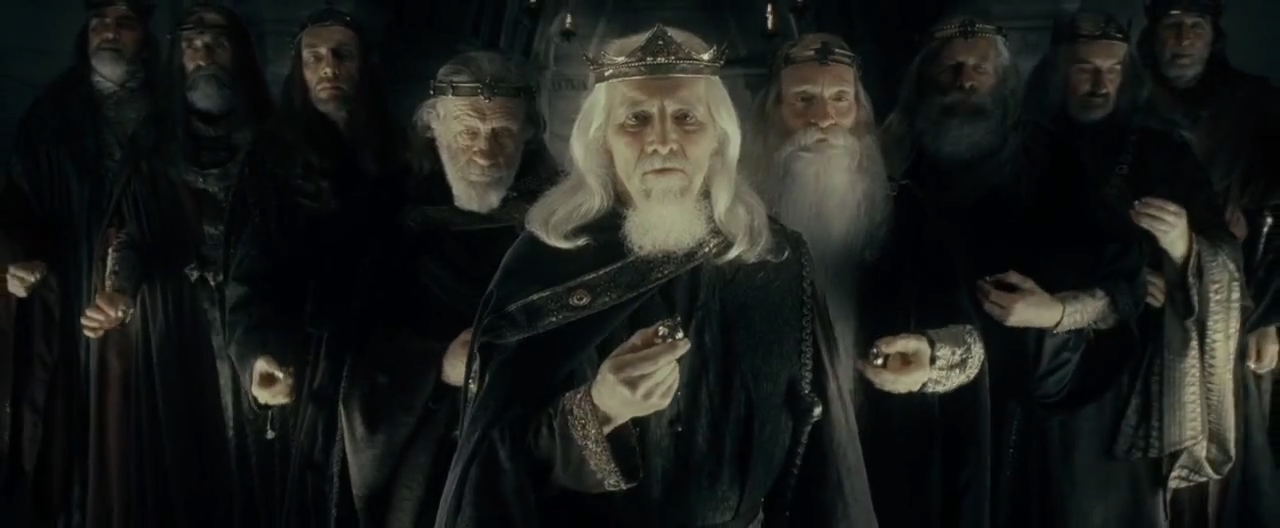
One Ring to rule them all, One Ring to find them,
One Ring to bring them all and in the darkness bind them.
Tolkien was a notoriously religious man, and of The Lord of the Rings he said that it was: “a fundamentally religious and Catholic work.” Despite the fact that Tolkien was Catholic, and very traditional, the plot of LOTR demonstrates a keen concern for a process that by the 1950s Tolkien was all too familiar with within religious circles. To some degree within the Catholic church, but probably more so among the Protestants. The power-brokering tied to institutions.
Rumor, and some degree of evidence, suggests that Tolkien played a big role in the conversion of C.S. Lewis from atheism to Christianity and was apparently dismayed by his choice to join the Protestant fold referring to it as: “a pathetic and shadowy medley of half-remembered traditions and mutilated beliefs.”
It would not be accurate to claim that Tolkien’s appreciation for tradition did include a comfort with the hierarchy of the Catholic Church. In fact, he was enamored with it in the absolute sense. It seems that more rumors have it that he was himself fond of monarchy as well. In the purely ornamental sense it seems:
“My political opinions lean more and more towards Anarchy (philosophically understood, meaning abolition of control not whiskered men with bombs) – or to ‘unconstitutional’ Monarchy.”
-Tolkien, November 1943
The problem I believe Tolkien is attempting to reconcile in his personal philosophy is the divide between total human liberty, and collective human security. He seems to – at a practical level – hold out for the possibility that a figurehead like a “king” or a “priest” improves “anarchy” by allowing for an overarching guidance on the ornamental things. However he reconciled his love for the Catholic Church with his distaste for human subjugation, he makes his position very clear here:
“the most improper job of any man, even saints (who at any rate were at least unwilling to take it on), is bossing other men. Not one in a million is fit for it, and least of all those who seek the opportunity.”
-The Letters of J.R.R. Tolkien
So having identified his personal opinions on government and on his work as a religious piece let’s turn now to the plot of The Lord of the Rings.
Sauron, who for all intents and purposes can be seen as Satan, devises a plan to “destroy the world of men” by creating a whole bunch of “rings of power”. 9 to be exact, are given to men “who above all else desire power.” Rings are given to other creatures too, but in the process Satan keeps the strongest one for himself: “One ring to rule them all, One Ring to find them, One Ring to bring them all and in the darkness bind them.” It is called “THE ONE RING”.
The “one ring” has an evil power over everyone that comes near it, especially men. Even the wise wizard Gandalf warns: “Understand Frodo, I would use this Ring from a desire to do good. But through me, it would wield a power too great and terrible to imagine.” The truly wise avoid this thing despite its temptations.
As the plot unfolds we see the power of the ring over men demonstrated over and over again. The 9 men that received the 9 rings become witch-slaves of Sauron himself. Referred to as Nazgûl, or “ringwraiths”, and while it may seem pretty desirable to ride around on a dragon, these grim reaper lookalikes were once kings, and now they are puppets of evil. Gandalf also warns: “Never put it on, for then the agents of the Dark Lord will be drawn to its power.”
There’s a familiar scene from the Bible that resembles this same dynamic, it goes something like this:
“All this I will give you,” he said, “if you will bow down and worship me.” – Matthew 4:9
As Tolkien disliked men “bossing other men” he also disliked Protestantism, and given the way each denomination sets out to create its own little monarchies, I can see why. Even with all of its warts, the Catholic church was at least consistent, and organized. The Priests aren’t just anyone that speaks smoothly and looks good in skinny jeans, but have all gone through a specific and rigorous preparation. They’ve also made significant sacrifices to accept the office they take and they remain relatively powerless in spite of it all. It seems certain that this is why Tolkien called C.S. Lewis an “Ulster Protestant”.
I’m persuaded by Tolkien’s position on this. If the Protestants insist on establishing thousands of little popes in place of 1 big one, then what is the benefit? If the body of believers cannot behave the way Jesus ordered us to in Matthew 23:8:
“But you are not to be called ‘Rabbi,’ for you have one Teacher, and you are all brothers.”
If we insist on just making little “pastor rings of power” for our own little empires, then why shouldn’t “brothers” return to Catholicism? If we can’t have an ideal anarchy (as Tolkien called it), then why not decorate the Priests, Bishops, and Cardinals in wide phylacteries and long tassels as a reminder of how ridiculous they look (see Matthew 23:5)? Let them remain a blatant symbol of everything Jesus warned against and we’ll probably be amazed to discover the humility that comes with it. At least they won’t be pretending to be anything but what they are. At least if they’re gonna pursue titles as an end in itself rather than a means, then they have to work to get there. Maybe the rigor and legalism will weed out the lazy and vain? Maybe there’s something to be said for Catholicism after all?
Anyway, it still remains to be seen whether a Matthew 23 “you are all brothers” “anarchy” can be established via reformation. Until then, don’t be afraid to explore.